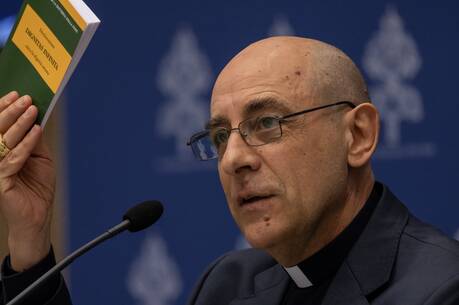Wake Up
Terry Golway’s column A Nation of Idol-Worshipers (7/31) was right on target.
It’s sad to see so many young adults wasting their time and energy for such low standards, while there are so many challenges everywhere to benefit society. There are numerous fields of labor that can make one feel fulfilled. The sad part of this pop culture is that our children feed on it.
Wake up, America; there is work to be done by you!
Regina Licameli
East Hanover, N.J.
Totally Innocent
In A Nation of Idol-Worshipers (7/31), Terry Golway acknowledges that he proceeds at the risk of sounding like a middle-aged crank. Although I can’t say whether or not the author is middle-aged, he is, in my opinion, a bona fide crankand, as he himself admits, a killjoy.
Mr. Golway bemoans the popularity of American Idol and America’s Got Talent. He holds the deadly serious view that television shows like these encourage our children to become idolized singers rather than doctors, social workers, engineers and teachers. Convinced that America is amusing itself to death, he is pessimistic about our country’s future.
I hold a different view. The fact that millions watch these shows and even phone in to vote for their favorites causes me to be optimistic about America’s future. In large numbers, my countrymen are ecstatic over totally innocent entertainment, devoid of sex, violence and crime.
Janet Pomeranz
Glen Cove, N.Y.
Real Talent
Terry Golway’s essay A Nation of Idol-Worshipers (7/31) rang true for me as it marveled at and sought to analyze the startling popularity of American Idol’ and its knockoffs. I admit as readily as Terry that actors and singers have long been regarded as secular gods and that the cult of celebrity and fame has been around for generations. When Americans made idols of such celebrities in the past, however, most seemed to be aware that this was a form of escapism, that they were indulging themselves in a fantasy world that was of little real significance. Many could also distinguish between the cult of personalities and the admiration of real talent.
George Stapleton
Park Forest, Ill.
Authentic Experience
As a layperson with some pastoral experience and a little knowledge of theology, I would characterize the relationship between the movements and the parish somewhat differently than Alan Figueroa Deck, S.J. (Where the Laity Flourish, 8/14). In my view, the movements are doing on a smaller scale what the parish should be doing on a much larger one. Thus the movements should not be regarded as a supplementary tool of evangelization; rather, they have emerged over time as a substitute for what in Europe, and increasingly now in this country, has become a moribund, ineffective local church. Indeed, history shows that the movements arise in those times and places where the local church fails to meet the spiritual longings and needs of its people.
As so clearly illustrated by Vincent Gragnani’s companion article in the same issue, participation in the movements allows Catholic laity an authentic experience of what it means to be the people of God, an experience many U.S. Catholics feel to be absent from their parish life.
For one thingand unlike the majority of parishesthe movements have a very clear sense of the church’s mission. And not only do the movements take lay witness seriously, they take for granted that laity share with clergy responsibility for the work of evangelization. That is why the movements are places where the Spirit’s gifts to each of the baptized are cultivated and allowed to flourish. Far from being seen as a threatwhich is often true in the parishthe leadership and decision-making skills of the laity are welcomed and counted on. Certainly it tends to be through participation in the movements that lay people involve and commit themselves to the specific witness that the Second Vatican Council taught is uniquely theirs. Reiterating council teaching in Evangelii Nuntiandi, Paul VI called lay Catholics to put their expertise and skills to the task of imbuing with Christian values the very webs of culture and society within which they live. For his part, John Paul II called for the renewal of local church life, so that parishes might be places where a Gospel conscience is formed, where consciousness of one’s baptismal call to holiness becomes the motive force for one’s life and decisions.
More important, perhaps, the movements provide a space wherein praying and working closely with others who share the same commitments, in learning and practicing together what it means to live one’s Catholic faith in an everyday waylay people get to know firsthand communion and fellowship in the Spirit like that recounted in the New Testament.
One could conclude that the ascendancy, the growing popularity of the movements todayand the important evangelizing role that Father Deck would assign thempoints implicitly to the substantial failure of U. S. clerical leadership to make the parish an effective agent for evangelization and outreach that it is meant to be!
Georgia Masters Keightley
Crawford, Neb.







